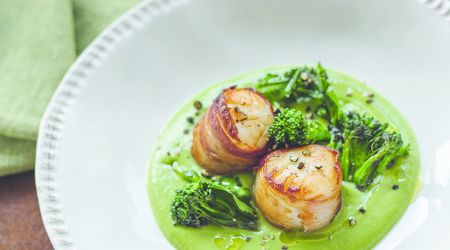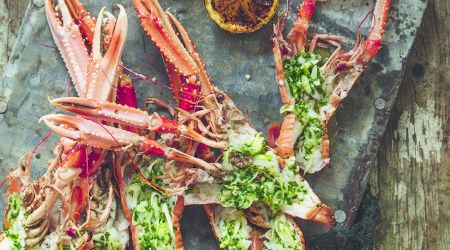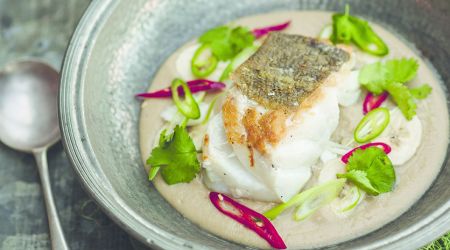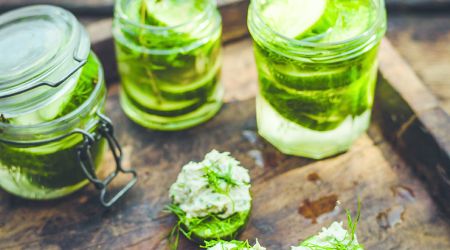The Kitchin Diaries -
Tom Kitchin was born in Edinburgh, the city where he lives today. He studied catering at Perth College before taking on an apprenticeship at the five-star Gleneagles Hotel. He worked under Pierre Koffman at Michelin three-star La Tante Claire in London for five years before short stints with Guy Savoy in Paris and Alain Ducasse in Monaco’s Le Louis XV. At the age of 29, he opened The Kitchin in a former whisky bond warehouse on Leith’s waterfront with his wife Michaela, who manages front-of-house operations. Six months later, he won a Michelin star, becoming the youngest Scottish chef to do so.
If Charles Dickens were to paint a linguistic portrait of a convivial Scottish chef, corkscrew curls, a grin as wide as Leith Walk and a bouncy Scottish brogue would feature highly among his traits. Vehement patriotism, a love of Scotland’s landscape and a pride in its produce would follow. And his name? Tom Kitchin will do nicely. To say Kitchin is but a caricature does the man a huge disservice. He’s done more to develop the Scottish restaurant scene than any of his countrymen before him. He’s ventured out, seen the zenith of the culinary world and brought his education back to Edinburgh; the archetypal prodigal son. Today, you’ll do well to plan a gastronomic jaunt to the city that doesn’t include a trip to one of his restaurants. He currently has three in Edinburgh alone and is expanding apace.
His flagship, Michelin-starred The Kitchin opened in 2006, excellent Castle Terrace launched in 2010, gastropub the Scran & Scallie in 2013 and this year sees Southside Scran and his first foray into the restaurant-with-rooms market with The Bonnie Badger. It’s been a busy few months for the man. ‘Yes, it’s growing, but we can manage it, you know?,’ he says with a wide smile. ‘When there are fires to be put out, we can move people around to control it. We keep the supply chain tight and know the producers that we use better than anyone.’ He touches on a topical point. As some restaurant groups are now reaping the impact of overexpansion, how to best exercise economies of scale and grow a business is big news at the moment. Measured growth is his mantra.
‘It also benefits the staff. Some of the guys have been with us for 13 years and they’re ambitious. To show them different facets of the business is healthy. It gives a genuine career path to those with the right attitude.’ Attitude, work ethic and drive are never far from the surface in a conversation with the world’s best chefs. For Kitchin, it was the vibe of a busy kitchen that suckered him in. ‘The big thing for me was when I took a job washing dishes at the local pub, aged 13. There was a top cook and all the shooters would come in with their haul. It wasn’t like I fell in love with cooking; I fell in love with the adrenaline of the kitchen,’ he says. ‘I was really into sports and played a good standard of football. Looking back, it was that team ethos, the speed of the service and the feeling that we were all in it together that made me want to succeed.’
There are plenty of near-sporting success stories elsewhere on the pass. Two-star Simon Rogan had trials for Chelsea, Launceston Place’s Ben Murphy was heading for QPR, Massimo Bottura could have played for Italy and Gordon Ramsay had a contract with Rangers before injury derailed his career. There must be something in the water bath.
GREAT EXPECTATIONS
Kitchin cut his teeth at Gleneagles Hotel. At the time, in the Nineties, its food was some of the best found in Scotland. ‘It had a proper old-school hotel brigade. There were 70 chefs in there; everything was made from scratch. The chef de partie was a 75-year-old Frenchman who would literally make terrines all day. It was proper cooking. A really good school.’ From where he lived near Gleneagles, in Auchterarder – population, 3,500 – aged 19, he took the leap to London to work with Pierre Koffman at Michelin three-star La Tante Claire. ‘It’s fair to say I was a fish out of water. I’d be walking across Albert Bridge to Chelsea from my bedsit wondering what the hell was going on. It was all about survival for the first six months and there wasn’t a day that I didn’t consider leaving.’
He joined a brigade that has since spawned some of the finest chefs of his generation. Tom Aikens was on one side and Helena Puolakka (Aster) was on the other. They forged a bond they share to this day. ‘Pierre was this big bear of a man who was in control of everything. When you heard his feet coming up the stairs, your heart would start to pound,’ he recounts. ‘As a young chef, the mind games were the most difficult thing. He’d be on the stove but had his eye on everything. I’d be like, “chef, how did you make that?” and he would be hiding his body round the pot so I couldn’t see.
He wouldn’t answer me and at the moment I was about to crack, he’d reel me in and tell me everything. It was a constant conveyor belt of chefs. Every Monday there would always be someone who left, so it would give you a bit of strength to know that you’d stuck it out a little longer.’ He must have been doing something right. Was there a point when he realised Koffman was pleased with his work? ‘You know, it was the weirdest thing. When he actually likes you, he’d pinch the bottom of your leg, or squeeze your shoulder with his big bear paws. That would be enough to send me skipping to the fridge. He pushed me to my absolute limits but then brought me back from the edge, which made me stronger. I’m not sure if you’d get away with it today, but he was the best teacher I’ve ever had and without doubt he is what made me the chef and man I am today.’
HARD TIMES
After five years with Koffman, Kitchin trained his sights on France and a stint with Guy Savoy. ‘There’s nothing glamorous about living in Paris with no money, let me tell you,’ he starts, before I get into asking him about his favourite patisseries. ‘We worked long hours and even though La Tante Claire was French-speaking, I didn’t have a grasp of the lingo. It was tough. Really tough.’ So when Koffman told Kitchin that his old pal Alain Ducasse was looking for someone to come to Le Louis XV, his Monte Carlo restaurant, he was out the door in a second. ‘It was beyond epic and came at the right time for me.
If I was 21, it would have chewed me up and spat me out, but at 25, my skin was a bit thicker and I knew how to handle myself. I could work quickly and cleanly, which marked me out from the French chefs, who acted as though it was their God-given right. I’d have given my right arm to be there. I was never going to take it for granted.’ Kitchin goes on to paint a barely believable tableau of cycling into France to buy his croissants in the morning, before heading east to Italy for his coffee. On days off he’d head into the Alps to ski, before heading back down to spend evenings on the beach. ‘For a young Scots lad it was unbelievable. I had some of the best times of my life.’ After a spell cooking on yachts and saving ‘my first proper salary’, his eyes were firmly on the prize. Was it a tough decision to open in Edinburgh? ‘Not really.
We didn’t have the budget to do it anywhere else. We started with 25 bottles of wine, a second-hand stove and Pierre’s old crockery from a warehouse in Wimbledon. It was five of us, so off we went.’ And off they went indeed. Six months after opening, The Kitchin won its first star. ‘It was mad,’ he says with a grin. ‘We had no backers and genuinely weren’t cooking for stars – we just wanted a full restaurant.’ Twelve years on, many are surprised it hasn’t been awarded another. ‘It’s tricky because you can become obsessed with it. I’d be lying if I said I wasn’t disappointed that the second hasn’t come, but we’ve grown and matured and it’s a completely different restaurant to what it was all those years ago. It’s never going to change the way I work; I’m hands-on, I meet the suppliers, I’m at the stove. A busy restaurant is the best accolade you can have.'
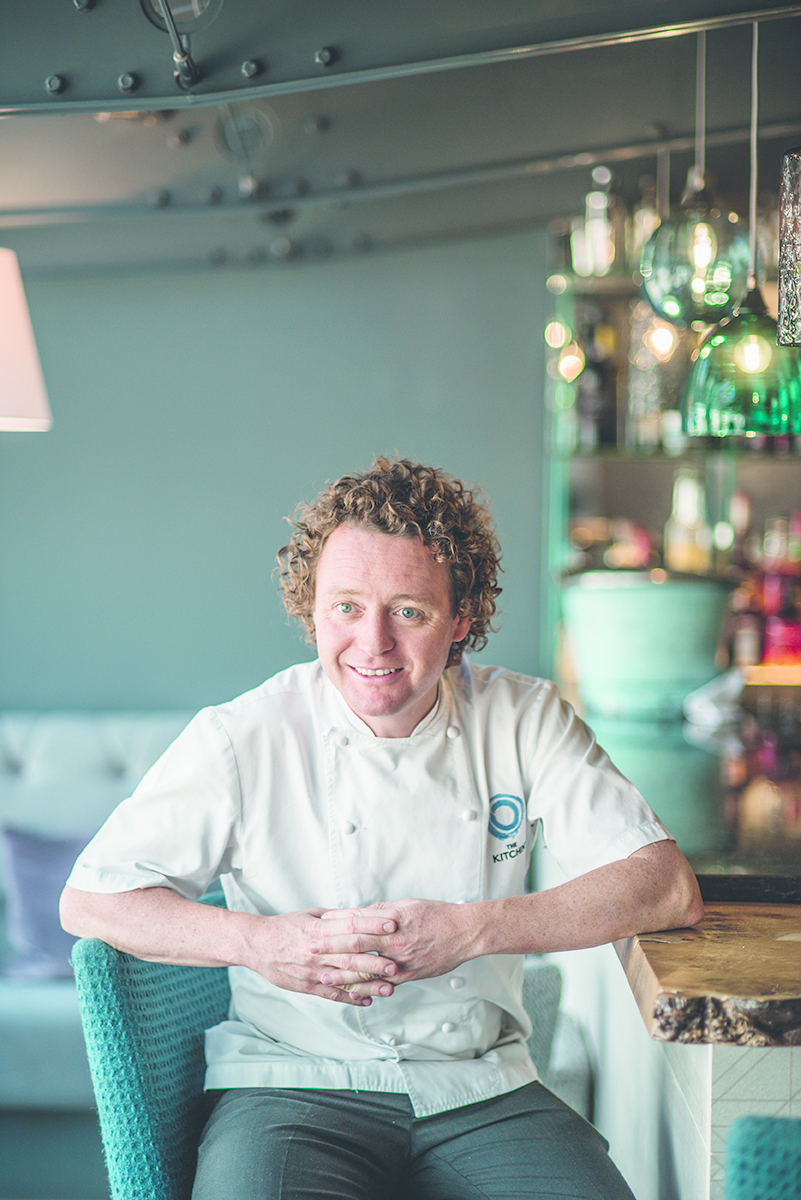
Recipes
Get Premium access to all the latest content online
Subscribe and view full print editions online... Subscribe

